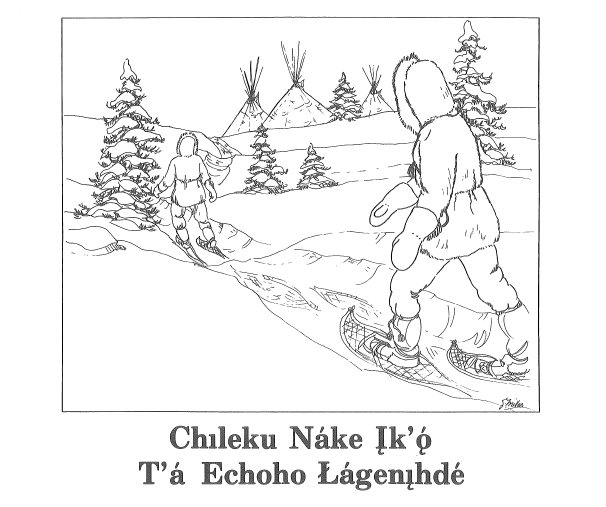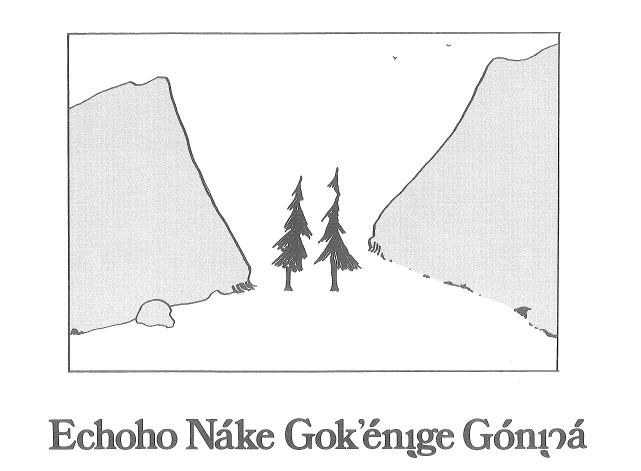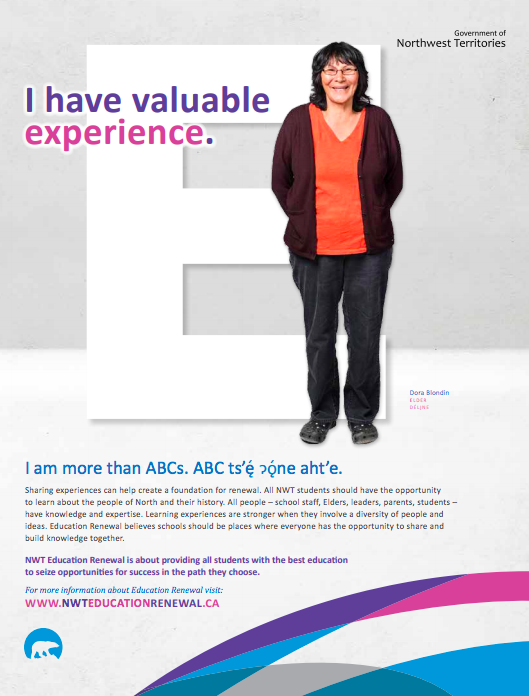Chıleku Náke Įk’ǫ́ T’á Echoho Łágenı’hdé.
This is a unilingual story with hand-drawn illustrations and Dene text. It also has an Englısh guide at the end of the document (p. 35) but it comes with clear instructions that the teacher is to use the document’s Dene language only when teaching. The story is also paired with a Dene questionnaire about the story for students. It is about two men who grow past marrying age: their community tells them to go look for wives, so they do so, and save a different community from monsters that have been eating people. They use Dene medicine to kill the monsters, and end up marrying and settling down in the new, saved community.
The first section reads:
Yahnı̨́ı̨ ts’ę́ chıleku náke, ts’ǫ́dane gı̨lı̨ gots’ę ts’éku gı́hchú le, ékagı̨t’é déot’ı̨nę hé dene gı̨lı̨ redı. Kút’a surı ɂǫhdaa ts’ę́ nǫwá le agejá ekáa gonǫ ékagóhdı. “Seyaa ékahht’e gha dúwé, ası̨́ dúle ts’éku hat’ı̨ ghǫ ɂaht’e,” góhdı. “Hęɂę,” gedı redı, “ékanı̨́ nı̨dé ts’éku hút’ı̨́ gha k’énaút’á kúlú,” gedı redı.

Access this Resource:
Available from the Ɂehdzo Got’ı̨nę Gots’ę́ Nákedı by permission of the Délı̨nę Got'ı̨nę Government. Contact This email address is being protected from spambots. You need JavaScript enabled to view it. for access and see the Release and User Agreement form on the database home page.
Modeste, Isodore, Jane Modeste and Fibbie Tatti. Chıleku Náke Įk’ǫ́ T’á Echoho Łágenı’hdé. Northwest Territories Department of Education and the Fort Franklin Band Council, n.d.
Echoho Náke Gok’énı̨ge Gónı̨á
This is a unilingual story with hand-drawn illustrations (by Sheila Hodgkinson) and Dene Kedǝ text. It is about a journey. The first section reads:
Yahnı̨́ı̨ ts’ę́ nę k’ále bek’ǫ́ne ekúu
Etı́ratǫ ekúhdé kwe náke ełets’ę́
Nı́danıhɂa, ets’énárakwé hé
Edúhnárakwé hé héredı sı̨́ı gok’énı̨ge ts’eretła le redı. Xaıdó yı́ı kúlú dene ke gohé tę táreɂé t’á dene łǫ tut s’ę́ hı́hłé redı

Access this Resource:
Available from the Ɂehdzo Got’ı̨nę Gots’ę́ Nákedı by permission of the Délı̨nę Got'ı̨nę Government. Contact This email address is being protected from spambots. You need JavaScript enabled to view it. for access and see the Release and User Agreement form on the database home page.
Modeste, Isidore, Jane Modeste, and Fibbie Tatti. Echoho Náke Gok’énı̨ge Gónı̨á. Northwest Territories Department of Education and Fort Franklin Band Council, n.d.
NWT Education Renewal: I Am More than ABCs.
From the Education, Culture, and Employment website:
The “I am more than ABCs” campaign was created to:
- bring awareness and understanding to the work of NWT Education Renewal
- connect people to accurate information on Education Renewal so they can learn more
- showcase how important the work of Education Renewal is for many people, who have willingly agreed to be part of the campaign
The statement, "I am more than ABCs" means that while it is critically important to develop strong basics like literacy and math skills, learning is more than just letters and numbers. Wellness, safety, relationship building, strengthening culture, language and identity are all important parts of learning as well. When these elements are nurtured in a school and community, it drives students to explore and grow their learning even further. The campaign makes the link between the past and the future, and explores the meaning of learning that is relevant to a world that is constantly changing.
The campaign celebrates relationships with many education partners. Northerners were photographed from all walks of life, each demonstrating that education is more than a focus on “ABCs” alone.

Access this Resource:
Sahtu region posters are available at this PDF: https://www.ece.gov.nt.ca/sites/ece/files/resources/sahtu-8_5x11-english-lowres.pdf
Individual posters are also available: https://www.ece.gov.nt.ca/en/services/renouveau-en-education-aux-tno/sahtu-i-am-more-abcs-posters
Government of the Northwest Territories. “NWT Education Renewal: I am More than ABCs.” [Poster], Yellowknife, 2017.
CMEC Aboriginal Educators’ Symposium, Summary Report
The CMEC Aboriginal Educators’ Symposium took place in Yellowknife, NT from June 29-30, 2015. It discussed “how to attract more Aboriginal people to teaching careers; how to encourage existing Aboriginal educators to remain in the profession; how to support Aboriginal students entering the field of education; and, how to support all Aboriginal educators in their training and career development” (1).
Read more about this event: https://www.cmec.ca/530/CMEC_Aboriginal_Educators%E2%80%99_Symposium.html
Access this Resource:
Click the link below for the open access PDF from the CMEC website.
Ets’ulah: “The language is like ets’ulah"
Ets’ulah is Dene Love Song, a neglected musical form that Laura Tutcho argues can be used to revitalize the Sahtúgotı̨nę language. Ets’ulah is “one of the oldest traditions for representing kinship links, family legacies, and ties to the land and life on the land.” (6) Laura Tutcho begins by presenting an overview of Dene history, and the importance of Dene language to knowing “who we are as people” (9) today. The history of the residential schools and the different attitudes of traders, missionaries, and teachers towards Dene language and culture are also presented. Next, the author talks about the current status of language teaching in Délı̨nę, making some key points:
- She recommends a bilingual upbringing that teaches children the language and also encourages graduation.
- She talks about a “cultural inclusion program” (12) that teaches children to drum, sing Slavey songs, sew, and survive on the land.
- She identifies a dire need for more Sahtú Dene teachers and recommends that the Délı̨nę Self Government priorities include a “strong position about how our children and people should be taught.” (13)
- She comments that Canadian laws, mǫ́la ɂeɂá, “can never do justice to our way of knowing.” (17)
The author talks about her own story, moving from the land to a formidable English day school at the age of 8 and needing to speak English to avoid the strap. She talks about the lessons she learned in her community and some of the traditions she remembers about hunting, taboos, and other teachings. One central question she addresses is how to engage youth in learning the same knowledge, particularly their Dene language. She sees ets’ulah as one way to get youth interested in Dene Kedǝ and Dene Ts’ı̨lı̨.
From Abstract: "My project is about how ets’ulah (Dene love song) can contribute to the revitalization of Sahtúgot’ı̨nę language. The Sahtúgot’ı̨nę language is spoken in the community of Délı̨ ne, Northwest Territories. My research highlights the Sahtúgot'ine tradition of ets'ulah, a musical form that will entice young people to use their language. Ets'ulah is the most neglected of the musical expressions of culture, yet one of the oldest traditions for representing kinship links, family legacies, and ties to the land and life on the land. I provide a study of noted singer the late Eliza Blondin to help revitalize Sahtúgot’ı̨ nę language through the value of ets'ulah, for as Besha Blondin, Eliza’s daughter, says, “the language is like ets’ulah”."
Read other University of Victoria Language Revitalization MA Theses from Susan Saunders and Fibbie Tatti.
Access this Resource:
This thesis has been made available open access by the University of Victoria: https://www.uvic.ca/education/indigenous/assets/docs/Tutcho_Laura_MEd_2016.pdf
Read more Masters in Indigenous Languages Revitalization Theses and Projects from UVic here: https://www.uvic.ca/education/indigenous/research/graduate/index.php
Tutcho, Laura. Ets’ulah: “The language is like ets’ulah.” Master’s Thesis, University of Victoria, 2016.
Shutaot’ine Intro
The first version of Shutaot’ine Intro, an app for both Android and Apple, was released on May 11, 2012. The app offers vocabulary and phase options to begin with. They are: Food, Body, Words, Buildings, Actions, Conversations, More, Order, Time, Days, Months, Numbers, Money, Quantity, Animals, Colors, Commands, Dene, Family, TPR Vocab, TPR, Song, and Introductions. Within each category, options let you “learn,” or take a lesson, play “games” of different levels, or take “quizzes” in listening, speaking, and reading.
From App Description:
Danet’e! The Government of the Northwest Territories Department of Education, Culture and Employment, Yamozha Kue Society and the Sahtu Divisional Education Council are delighted to present a North Slavey language app available on the Google Play store. Shutaot’ine Intro offers language learning, practice, games and quizzes in many everyday categories such as food, actions, conversation, family and introductions. Learn your language and surprise your Elders! Mahsi cho.
Access this Resource:
To use this application, download it for free from one of the following links:
Google Play (Android devices): https://play.google.com/store/apps/details?id=com.languagepal.androidjessee_north_slavey&hl=en_GB
The App Store (Apple devices): https://itunes.apple.com/NZ/app/id524858939?mt=8
Yamózha Kúé Society, Northwest Territories Department of Education, Culture and Employment, and the Sahtú Divisional Education Council. Shutaot’ine Intro. Mobile Device Application. Version 1.1, December 15, 2015.
Education Renewal and Innovation Framework: Directions for Change
This report captures a 3 year segment of an existing 10 year education renewal framework: a “comprehensive review and renewal of the education system in the NWT…. the first such undertaking since the early 1980s.” It includes several areas of action that highlight the continued importance of Aboriginal Language Culture Based Education (ALBCE), Elders in schools, enhanced support for teachers, post-secondary opportunities in the NWT, and community-driven education.
Access this Resource:
The Education Renewal Framework is available on the GNWT website as of May 2018.
Government of the Northwest Territories Department of Education, Culture and Employment. Education Renewal and Innovation Framework: Directions for Change. [Three-Year Education Renewal Action Plan], Yellowknife, June 2015.
Creating Able Human Beings: Social Studies Curriculum in the Northwest Territories and Nunavut, 1969 to the Present
McGregor examines social studies curricula from the point of transfer of responsibility for education to the Northwest Territories (1969-70) forward 30 years. She argues that the intention of all such curricula has been to be culturally responsive, but that this has been accomplished inconsistently. She adds the term culturally founded to refer to curricula developed by Aboriginal communities, and recommends that efforts to integrate these efforts continue. Dene Kede is the best effort toward culturally founded curriculum thus far, but requires more support for teachers, who must reconcile Dene Kede with other required social studies documents.
Access this Resource:
As of May 2018, this paper is available open access.
McGregor, Catherine A. “Creating Able Human Beings: Social Studies Curriculum in the Northwest Territories and Nunavut, 1969 to the Present.” Historical Studies in Education Special Issue: Education North of 60 27, no. 1 (2015): 57-79.
Learning from the land: Indigenous land based pedagogy and decolonization
The authors introduce a special issue of Decolonization on the topic of land-based education. They frame the articles to follow with the premise that separating Indigenous peoples from land is a fundamental quality of colonization; and, as such, land-based education is an essential component of decolonization.
From Abstract:
This paper introduces the special issue of Decolonization on land-based education. We begin with the premise that, if colonization is fundamentally about dispossessing Indigenous peoples from land, decolonization must involve forms of education that reconnect Indigenous peoples to land and the social relations, knowledges and languages that arise from the land. An important aspect of each article is then highlighted, as we explore the complexities and nuances of Indigenous land-based education in different contexts, places and methods. We close with some reflections on issues that we believe deserve further attention and research in regards to land-based education, including gender, spirituality, intersectional decolonization approaches, and sources of funding for land-based education initiatives.
Access this Article:
The full PDF of this article is available from Decolonization online.
Wildcat, Matthew, Mandee McDonald, Stephanie Irlbacher-Fox, and Glen Coulthard. “Learning from the land: Indigenous land based pedagogy and decolonization.” Decolonization: Indigeneity, Education & Society 3, no. 3 (2014): I-XV.
Dechinta Bush University: Mobilizing a knowledge economy of reciprocity, resurgence and decolonization
Ballantyne uses Dechinta, 'Bush University,’ as an example of a decolonizing space, and comments on the responsibilities of settlers interested in decolonization theory. The author begins by addressing her own settler roots, then turning to the history of oil development in the Northwest Territories. She discusses the Berger inquiry, the land claim processes, and the diamond boom, and argues that the sense of inevitability with which resource exploitation is treated is counterintuitive to decolonizing efforts. Inevitability is inculcated in the early space of youth education, and Ballantyne reflects on experiences working in Fort Good Hope that helped her realize that a contextualized, land-based, collaboration-based pedagogy could be far more transformative for youth than classroom-based education.
From Abstract:
This article explores Dechinta Bush University as an Indigenous place-based movement that contributes to personal and collective transformation through mobilizing land-based knowledge and learning within a comprehensive strategy of resistance to settler capital. Through the production of a knowledge economy intervention, the pedagogical and political strategies of Dechinta are explored as a proven example of multi-scalar transformational decolonization that has far-reaching personal, collective, institutional, political and economic impacts. Through a detailed exploration of the five-year process of collective imagining, mobilizing and operating Dechinta Bush University, this article gives critical insights into closing the gap between the call for mass-scale decolonization and the dismantling of settler capitalism by exploring pathways which orient the land and Indigenous knowledge as relationships and core values mobilized towards a resurgence reality. Dechinta is herein conceived as a pathway movement of arming oneself with knowledge to fight the hierarchical scales of settler politics, a movement where collective and personal transformation through learning on the land is part and parcel of a strategy of resistance to settler capital, producing an alternative knowledge economy centered around the value of land as an infinite producer of health, knowledge, and sustainable, self-determining communities.
Read more about Dechinta on this database, or consult its website.
Access this Resource:
Read the full PDF on Decolonization online.
Ballantyne, Erin Freeland. “Dechinta Bush University: Mobilizing a knowledge economy of reciprocity, resurgence and decolonization.” Decolonization: Indigeneity, Education & Society 3, no. 3 (2014): 67-85.


 Phone: 867-374-4040
Phone: 867-374-4040 Email:
Email: